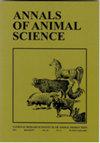The potentials of Phytoestrogen compounds in aquaculture – a review
IF 1.9
4区 农林科学
Q1 Veterinary
引用次数: 0
Abstract
Abstract All organisms require the ability to engage in either sexual or asexual reproduction in order to ensure their own survival. In aquaculture, when one sex outgrows the other faster, farmers use hormones to stimulate growth. Furthermore, the production of fish based on sexual dimorphism is predominantly executed through the utilization of estrogens and androgens. Environmentally, these compounds may pollute the ecosystem and cause endocrine system alterations that cause harmful effects; thus, they must be handled carefully to assure environmental, biological, and food safety. Phytoestrogens as natural non-steroidal phenolic plant chemicals that resemble 17-β-estradiol, could be employed as a safe alternative source of natural estrogens. The phytoestrogens have many biological effects due to their ability to compete with estrogen receptors, but they may negatively affect fish production, reproduction, and behaviors under controlled conditions. Thus, the current literature emphasizes on the beneficial effects of phytoestrogens on aquatic animal performance, behaviors, and some reproductive features.植物雌激素化合物在水产养殖中的应用前景综述
所有生物都需要有性繁殖或无性繁殖的能力,以确保自身的生存。在水产养殖中,当一种性别的生长速度超过另一种性别时,农民使用激素来刺激生长。此外,基于两性异形的鱼的生产主要是通过利用雌激素和雄激素来实现的。在环境方面,这些化合物可能污染生态系统并引起内分泌系统的改变,造成有害影响;因此,它们必须小心处理,以确保环境、生物和食品安全。植物雌激素是一种天然的非甾体类酚类植物化学物质,类似于17-β-雌二醇,可以作为天然雌激素的安全替代来源。植物雌激素由于其与雌激素受体竞争的能力而具有许多生物学效应,但在受控条件下它们可能对鱼类的生产、繁殖和行为产生负面影响。因此,目前的文献强调植物雌激素对水生动物生产性能、行为和一些生殖特征的有益影响。
本文章由计算机程序翻译,如有差异,请以英文原文为准。
求助全文
约1分钟内获得全文
求助全文
来源期刊

Annals of Animal Science
AGRICULTURE, DAIRY & ANIMAL SCIENCE-
CiteScore
3.80
自引率
5.30%
发文量
138
期刊介绍:
Annals of Animal Science accepts original papers and reviews from the different topics of animal science: genetic and farm animal breeding, the biology, physiology and reproduction of animals, animal nutrition and feedstuffs, environment, hygiene and animal production technology, quality of animal origin products, economics and the organization of animal production.
 求助内容:
求助内容: 应助结果提醒方式:
应助结果提醒方式:


